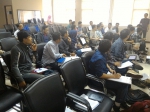Librarians: Managers of Academic Integrity and Knowledge

BANDUNG, itb.ac.id—The Literacy, Media and Culture Research Group of FAD (Faculty of Arts and Design) ITB (Institut Teknologi Bandung) organized a workshop titled “Highlighting Librarians’ Role to Strengthen Academic Integrity” on Thursday (14/10/2021). The event was attended by Ida Fajar Priyanto, Yona Primadesi, and Fitrina Cahya.
The workshop- which serves as an online community service program- was hosted by Ferry Fauzi Hermawan. Opening speeches were delivered by Lusia Marliana Nurani (ITB’s Head of Community Service), Hada Hidayat Margana (Head of the College Library Forum of Indonesia), and Tri Sulistyaningtyas (Head of the Literacy, Media and Culture Research Group of FAD ITB) correspondingly.
“As we all know, librarians are no longer synonymous with the general assumptions of working as “bookkeepers”; instead, they act as professional managers of knowledge who tackle complex academic matters in universities,” Tri Sulisytaningtyas claimed.
“Mastery towards informational literacy is not solely related to its materials, but also with its performance and teaching strategies. Through this program, communities can fully realize the importance of librarians in the academic world,” he added.
Librarians and Their Academic Integrity
The first speaker was Ida Fajar Priyanto, Ph.D., a postgraduate professor in UGM (University of Gadjah Mada) who studied library and information science. “Soon, the comparison between Generation Z and Alpha attending college is 1:2. In my age, the highest average of that comparison is 1:4,” he illustrated.
He then explained the four future paradigms of universities and the academic traditions that encompass time, knowledge, and publication- all three require the virtue of integrity. “Academic integrity is applying the values of honesty and responsibility in science. Due to its unclear signs presented to students throughout college, several clarifications need to be done, such as showing the proper way of researching and being honest in academic practices."

Figure 1. Ida Fajar Priyanto explained the education cycles.
Libraries carry six roles in building success among the people. Firstly, they develop communication with all institutional units. They also promote the courage and visibility of academic communities. Ensuring their scholastic works are aligned with the university's vision and mission, libraries take part in controlling their production and output. Lastly, they serve as the medium of communication for science and academic integrity.
Dr. Youna Primadesi from the State University of Padang continued the session by describing universities’ demand for information via libraries. She mentioned that it is crucial to be aware of librarians’ duties to understand the required information and trends for the communities.
“College communities use the most advanced, scientific, and specific materials. Thus, we must not only try to learn the process of gathering information but also the interaction between librarians and the people,” Yona stated.
When the interaction between librarians and their communities is established, they may help provide the required references in academic works of literature. Within its frameworks, critical reasoning, comprehension, conversion, and conveyance of source information are important. After acquiring the relevant information, writing these into newer, revised ones are proven to be a difficult task.
The third presenter was Fitrina Cahya from UGM. She stated the five basic principles of academic integrity are honesty, trust, fairness, respect, and responsibility. She also specified the three places to seek emotional stability: houses, offices/campus universities, and other welcoming spaces- café, parks, and libraries- where people spend their time interacting with people and doing their work. For instance, students in Singapore prefer to study in libraries compared to other places during the exam period.
Cahya emphasized that librarians are necessary for preserving the values of honesty and responsibility in research and services to encourage academic integrity. Besides listing several negligences to academic integrity like plagiarism, he also gave inputs and suggestions to be implemented such as websites features that analyze texts.

Figure 2. QnA session in the workshop. Description: Yoka Adam Nugraha, Ida Fajar Priyanto, Yona Primadesi, dan Fitrina Cahya (left to right, top to bottom)
After the closing statements by Ida, the discussion session between the audience and the three guests began, which was led by Yoka Adam Nugraha. The speakers shared several pieces of advice to improve the quality of libraries and librarians.
Reporter: Hasna Khadijah (Teknik Lingkungan, 2019)
Translator: Ruth Nathania (Teknik Lingkungan, 2019)

scan for download








